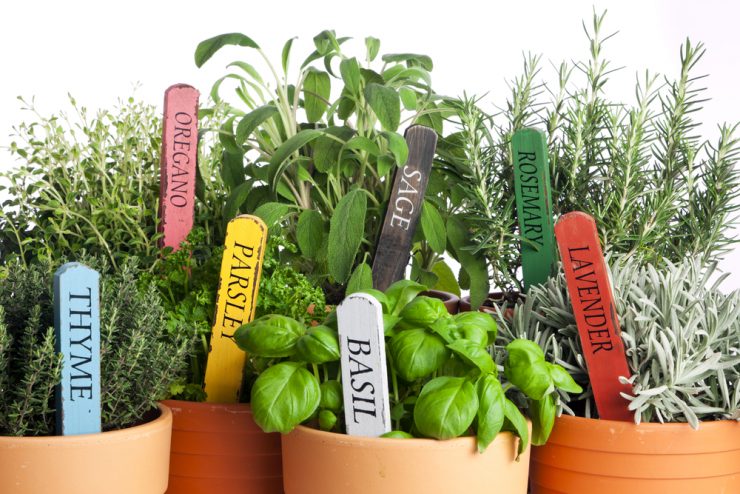A sprig of rosemary or thyme can add flavour and taste to the blandest of dishes. But they also have a range of health benefits for body and mind: they can help boost your immune system, relieve stress and soothe a troubled gut.
Editor Jane Garton looks into the herbs nestled in our kitchen cupboards and the health benefits they provide.
Rosemary (Rosmarinus officinalis)
With its blue flowers and spiky leaves, rosemary is a familiar sight on hillsides throughout the Mediterranean where it is widely used in its cuisine. As well as being a favourite cooking herb, rosemary has long been linked with boosting memory. Recent research[i] suggests it may indeed improve our recall, especially long term and so-called ‘prospective’ memory that we use to remind us to do things.
The reason? Rosemary is packed with potent plant chemicals: one of which is eucalyptol, which may help protect a brain messenger chemical that is key to memory.
How to use it:
Rosemary, fresh or dried, is a popular flavouring for meats, especially roast lamb. It is also used in soups, sauces, stuffings, marinades and stews. It often features as an ingredient in bouquet garn and herbes de Provence while small amounts can be finely chopped and added to breads, cakes and biscuits.
Turmeric (Curcuma longa)
Best known for giving curries their yellow colour, this orange-coloured root is attracting scientific attention. Its major active ingredient, the plant pigment, curcumin. has anti-inflammatory and antioxidant properties.
Among other things, turmeric can help protect against heart attacks by helping to prevent blood clots (thrombosis), according to research.[ii] Another study[iii] suggests it may enhance cognition (concentration, attention and memory) and help delay or prevent nervous system diseases, including Alzheimer’s.
How to use it:
Add turmeric powder, or preferably root which is becoming more widely available, to soups, curries, rice, meat and fish dishes. You can even try it in yoghurt and smoothies.
Sage (Salvia officinalis)
Known by some as the ‘guardian of herbs’, sage has enjoyed a long reputation for boosting longevity. With their distinctive aroma, the velvety leaves of this perennial plant are a vital ingredient in dishes worldwide.
It is known for its antispasmodic, antimicrobial, anti-fungal and anti-inflammatory actions. It also has calming properties as well as hormone-balancing effects. Sage is also highly valued by medical herbalists for helping with hot flushes, sweats and other menopausal symptoms.
How to use it:
Perfect for adding flavour to a variety of savoury dishes especially pork and poultry. For hot flushes try drinking a cup of sage tea one to three times a day using a handful of fresh, washed sage leaves or one teaspoon of the dried herb in a mug.
Mint (Mentha spicata)
The refreshing flavour, aroma and medicinal properties of mint have been known and appreciated for thousands of years. It is often used to help to ease flatulence, bloating and indigestion and to encourage sweating. It can help to clear catarrh and as an inhalation can relieve respiratory problems such as coughing, nasal congestion, and other symptoms of the common cold.
In addition it has antiseptic and mildly anaesthetic properties. Recent studies[iv] have also shown it may also help to bring relief to IBS symptoms such as pain, muscle spasms and flatulence.
How to use it:
Drink it as a tea or add some leaves to salads. Mint is of course a perfect accompaniment to lamb and works well with ice creams and sorbets.
Thyme (Thymus vulgaris)
Awarded the title of Medicinal Plant of the Year in Germany 2006, thyme packs a powerful nutritional punch. Rich in vitamin C, it adds a strong characteristic flavour to almost any dish. It is used traditionally to help infections, coughs, colds, acute and chronic bronchitis and catarrh.
The essential oil of thyme contains thymol, which is a natural antiseptic and expectorant. It is also thought to have immune-boosting properties[v]
How to use it:
Fresh or dried, thyme is the perfect seasoning for soups, sauces, and casseroles. It has an affinity with potatoes and rice, and goes well with other Mediterranean herbs like oregano, marjoram and rosemary.
[i] /www.ncbi.nlm.nih.gov/pubmed/29389474
[ii] https://www.ncbi.nlm.nih.gov/pubmed/19233493
[iii] https://doi.org/10.1017/S0007114515004687
[iv] www.ncbi.nlm.nih.gov/pubmed/30654773
[v] www.ncbi.nlm.nih.gov/pubmed/27860473















Add comment